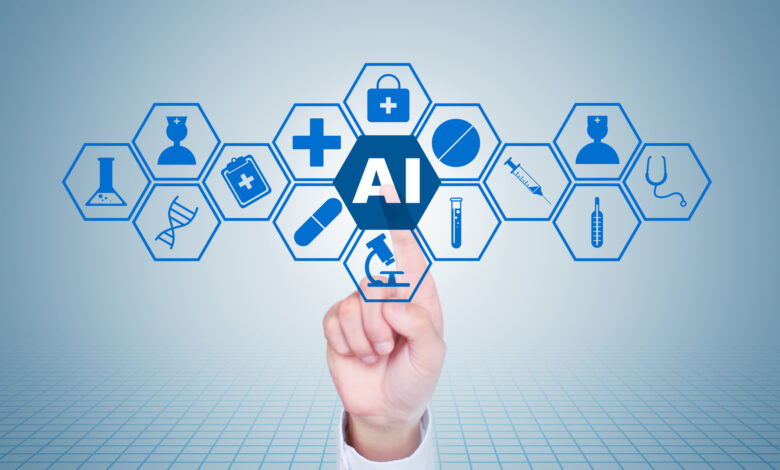AI Use in Clinical Practice

The use of artificial intelligence (AI) in medicine is not a new concept. The first AI in Medicine workshop, sponsored by the National Institute of Health, was held in 1975 at Rutgers University.1 However, while we may be years away from using AI in medicine to its highest potential, AI has already been successfully implemented to advance translational research and diagnoses.
AI-Based Innovations in Medicine
AI has the potential to improve clinical practice both by advancing translational therapeutic research and by improving diagnosis and treatment practices.
Improving Clinical Research and Therapeutics
Drug development is an essential aspect of health care. In 2019 alone, $83 billion was invested into the discovery and study of new therapeutics, including safety and efficacy trials, post-marketing/real-world trials, and other related research. Yet, from 2010 to 2019, an average of only 38 drugs per year received FDA approval.2 New AI-based platforms may help researchers develop new therapeutics more efficiently and affordably.
One research group combined 3 different AI models to produce and validate a novel small molecule in vitro for the treatment of hepatocellular carcinoma. The group used AlphaFold, PandaOmics, and Chemistry42 to predict proteins and protein structures responsible for the disease and to generate a novel therapeutic target.3 Further research is needed to evaluate the safety and efficacy of this new therapeutic target in vivo; however, this proof-in-concept does demonstrate how AI can be utilized to determine potential treatment options for previously untreatable diseases.
Diagnostic Applications
More immediately, AI is being investigated as a means to assist clinicians in improving patient care. One such potential is in diagnosing diseases based on medical imaging, and several AI models have been developed for this purpose. The FDA has been accelerating the approval rate of AI platforms, particularly those involving machine learning. For example, the Centers for Medicare and Medicaid Services has permitted reimbursement for the use of some AI platforms as diagnostic tools using medical imaging, which has helped propel the adoption of AI in clinical settings. These approvals, however, are primarily in the form of FDA clearances, which have a lower regulatory threshold compared with the requirements of full-fledged approvals (i.e., the data on which these clearances are based often come from unpublished, retrospective, single-institution studies that are considered proprietary). Thus, moving forward, additional research with higher standards is needed to measure and validate the impact these AI models have on patient outcomes.4
The Future of AI in Medicine
AI-Designed Vaccines
The use of AI to design new therapeutics with known targets for well-established diseases is still in its infancy. However, one particularly interesting application of this work is the ability of AI to predict newly evolved diseases and help in the development of novel vaccines. The development of certain vaccines such as for the flu and/or COVID-19 is based on a currently circulating variant that is likely to mutate or evolve by the time the vaccine is manufactured, approved, and distributed. As a result, vaccines are sometimes not as effective as they need to be.5 In cases such as this, AI could be used to predict new viral variants, which will help researchers design more effective vaccines for the public.
The New Doctor: Your Phone App
AI could potentially diagnose different medical conditions quickly based on straightforward visual data, such as an MRI scan or a video. For example, 1 unpublished study suggests that researchers may be able to develop a predictive machine learning AI smartphone-based app to diagnose a rotator cuff tear, with over 90% accuracy, by analyzing a 10-second video wherein the subject performs a simple, string-pulling kinematic task to test mobility.6 Such results suggest that AI could assist researchers in developing health care-focused apps that enable individuals of low mobility and/or limited means or those located in rural settings to receive timely and important medical diagnoses and treatment information — removing the need for an outpatient visit during the initial screening phase.
Potential Problems with AI
Although the utility of AI in improving patient care shows promise, there are potential risks for bias and inaccuracies when using AI in health care. AI algorithms are trained using relevant data sets. For example, if a hospital wanted to predict, based on pre-existing conditions, a patient’s likelihood to recover following a heart attack, they may feed an AI algorithm real data on similar clinical cases that occurred over the past decade. However, race is often correlated with different health outcomes, with White patients typically having better health outcomes compared to non-White patients.7 One repercussion is that AI may always predict that Black patients are less likely to survive and, thus, direct clinicians to provide additional resources to White patients rather than Black patients. Even if AI was not intending to be racist, the blind use of these models could exacerbate further racial disparities in health care. As a result, clinicians must always be mindful of the data that are being used to train AI and the potential consequences if AI models are not critically evaluated for equity issues.
As anyone who has already attempted to write a fact-based paper using ChatGPT knows, the final product is likely to be riddled with fake studies and references. Generative AI tends to make up, or “hallucinate,” material. This problem is a non-starter in health care, where a small inaccuracy can result in the death or injury of a patient.
Practical Use Today
Until researchers develop safeguards to ensure that AI-based models are generating accurate data and outcomes, clinicians need to thoroughly and critically examine the output of such models before applying the findings to clinical practice. Although advances are still needed before AI models are to be fully trusted for use in medicine, clinicians may still consider investigating how AI could potentially enhance their own medical practice.



